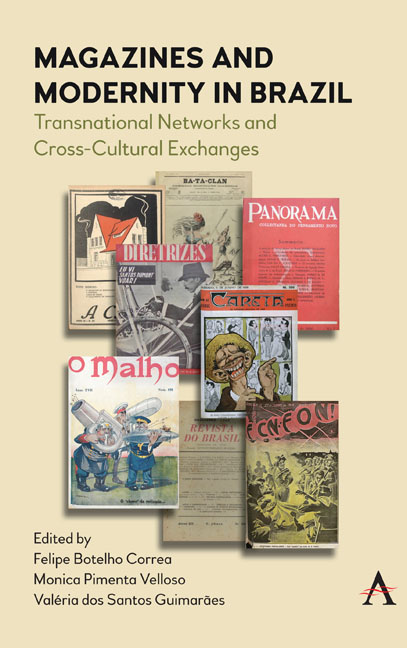Book contents
- Frontmatter
- Contents
- List of Figures
- List of Contributors
- Introduction
- Chapter 1 The French Periodical Print Culture In Brazil: A Survey of Catalogues and Mediators (1800–1945)
- Chapter 2 The Transnational Model of Popular Illustrated Magazines: Three Case Studies from Brazil (1900–20)
- Chapter 3 The Transnational Networks of the Modernist Periodical Print Culture: The Magazine Lumière in the Aftermath of WWI
- Chapter 4 Versions of Modernity in the Household Magazine A Casa (1923– 45)
- Chapter 5 Panorama Magazine and the Far-Right in Brazil (1936–37)
- Chapter 6 Against Nazi-Fascism in Brazil: The Case of the Magazine Diretrizes (1938–44)
- Chapter 7 Literary Inquiries and Disputes on Global Modernism: the Debate in Brazil During WWII
- Chapter 8 Modernity and Modernisms in the Magazine Sombra (1940–60)
- Index
Chapter 5 - Panorama Magazine and the Far-Right in Brazil (1936–37)
Published online by Cambridge University Press: 04 February 2022
- Frontmatter
- Contents
- List of Figures
- List of Contributors
- Introduction
- Chapter 1 The French Periodical Print Culture In Brazil: A Survey of Catalogues and Mediators (1800–1945)
- Chapter 2 The Transnational Model of Popular Illustrated Magazines: Three Case Studies from Brazil (1900–20)
- Chapter 3 The Transnational Networks of the Modernist Periodical Print Culture: The Magazine Lumière in the Aftermath of WWI
- Chapter 4 Versions of Modernity in the Household Magazine A Casa (1923– 45)
- Chapter 5 Panorama Magazine and the Far-Right in Brazil (1936–37)
- Chapter 6 Against Nazi-Fascism in Brazil: The Case of the Magazine Diretrizes (1938–44)
- Chapter 7 Literary Inquiries and Disputes on Global Modernism: the Debate in Brazil During WWII
- Chapter 8 Modernity and Modernisms in the Magazine Sombra (1940–60)
- Index
Summary
Considered the first Brazilian mass movement, the right-wing Ação Integralista Brasileira (AIB) was one of the most important political parties of the first half of the twentieth century in the country, despite its short duration (only five years). Founded in October 1932 by the writer and journalist Plínio Salgado, the group took part in elections, electing councilmen, deputies and mayors, and nominating a presidential candidate in elections that were suppressed by the emergence of the Estado Novo. According to more conservative estimates, the AIB had around 250,000 supporters (the party claimed that their ranks reached more than one million followers), and has been considered the largest fascist movement in the Americas, surpassing prominent entities like the Chilean Nacismo and the Mexican synarchism.
This chapter focuses on how the transnational spread of fascist ideas in the interwar period shaped the emergence of the AIB. We explore the correlation between the themes and authors published in the magazine Panorama, who were eager to debate the role of Far-Right ideas in the global scenario in the mid-1930s, but with the political aim to intervene in the Brazilian context. Like other fascist associations in various countries, the AIB had as its doctrinal orientation anti-communism, anti-liberalism and nationalism. The organization used symbols such as the green shirt, a greeting (‘anauê’), the ‘sigma’, the motto ‘Deus, Pátria e Família’ (‘God, Fatherland and Family’), and organized various parades and paramilitary troops. Although not doctrinal in character, anti-Semitism had a strong presence in its ranks. Moreover, even though they have been involved in a number of street conflicts with the left-wing groups or the police, it is false to imagine that such an organization was made up of ruffians and idlers. Many well-known intellectuals were among their adherents and leaders: Gustavo Barroso, president of the Brazilian Academy of Letters and director of the National Historical Museum; Miguel Reale, then a law student, later jurist, philosopher of law and dean of the University of São Paulo; Luís da Câmara Cascudo, historian and folklorist; and San Tiago Dantas, future chancellor in the João Goulart government, among others.
The integralists made use of a vast press organization.
- Type
- Chapter
- Information
- Magazines and Modernity in BrazilTransnational Networks and Cross-Cultural Exchanges, pp. 95 - 114Publisher: Anthem PressPrint publication year: 2020



